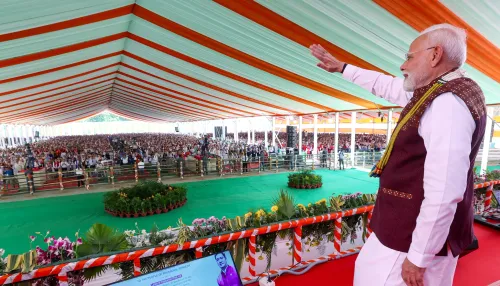Is the Govt Introducing a Skill-Based Curriculum for Classes 11 and 12?

Synopsis
Key Takeaways
- Introduction of skill-based curriculum for Classes 11 and 12.
- Aligns with National Education Policy (NEP) 2020.
- Focus on holistic and practical education.
- Bridges gap between theoretical knowledge and practical skills.
- Consultation with academic institutions and industry leaders.
Chennai, Sep 21 (NationPress) The Union government is set to introduce skill-based education into the curriculum for Classes 11 and 12, adhering to the guidance from the National Education Policy (NEP) 2020, as stated by Union Education Minister Dharmendra Pradhan on Sunday.
During his address at the Dakshinapatha Summit 2025, hosted at the Indian Institute of Technology (IIT) Madras, Pradhan emphasized the necessity for a fundamental shift in teaching methodologies to create a more holistic and practical education.
“We are actively working on integrating a skill-based curriculum at the senior secondary level. The National Education Policy has strongly advocated for this change, and we are confident that this will equip students for a successful future,” the minister remarked.
He noted that the current educational framework has been primarily focused on degrees and certificates.
“Prime Minister Narendra Modi rightly pointed out that while degrees and certifications hold significance, it is crucial to ensure that students possess competence and skills. Our aim is to close this gap by incorporating practical abilities into mainstream education,” Pradhan added.
The minister also disclosed that the government is aiming to introduce skill-based education as early as Class 6.
“Previously, skill development was optional and selective. However, going forward, it will be a formal component of school education as a subject. This will guarantee that students not only gain knowledge but also cultivate competencies that are pertinent to the evolving job market,” he elaborated.
Pradhan underscored that this initiative signifies a transition from rote learning to competency-driven education, in line with the NEP 2020’s objective of nurturing creativity, innovation, and employability among students.
“Skill-based education is one of the pivotal recommendations of NEP 2020. The goal is to prepare learners not just for exams but for life beyond the classroom, where problem-solving, adaptability, and innovation are paramount,” he stated.
The proposed curriculum is anticipated to encompass a broad spectrum of vocational and practical skill areas, allowing students to either pursue higher education or confidently enter the workforce.
The education ministry, Pradhan mentioned, is currently consulting with academic institutions, industry leaders, and policymakers to devise the structure of the new curriculum.
“This will be a significant milestone in creating a globally competitive and skilled workforce from the grassroots,” he concluded.









